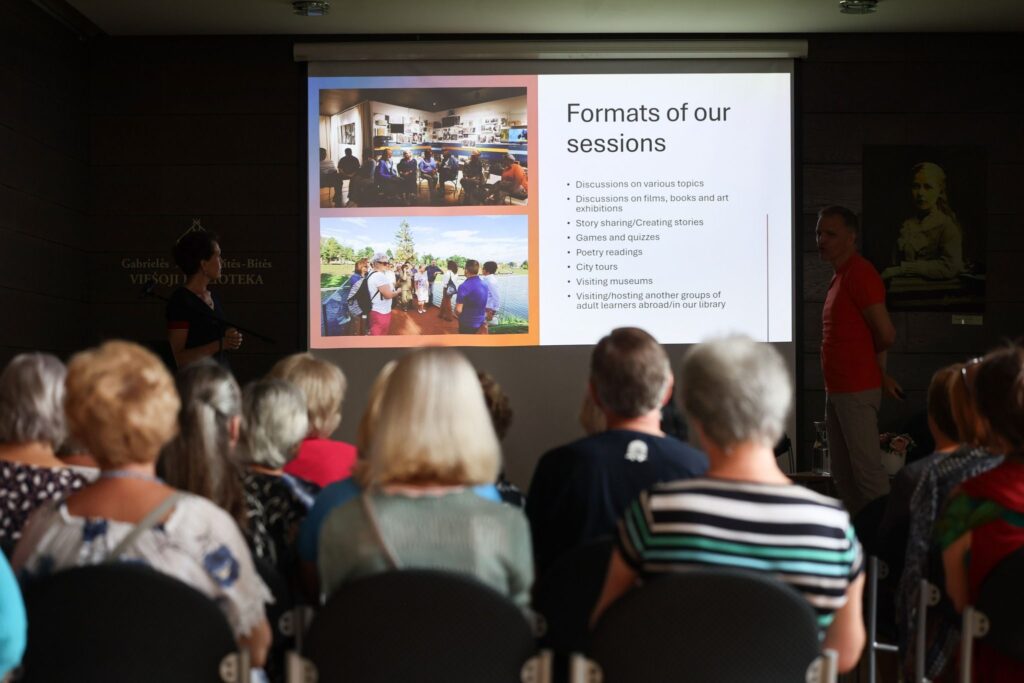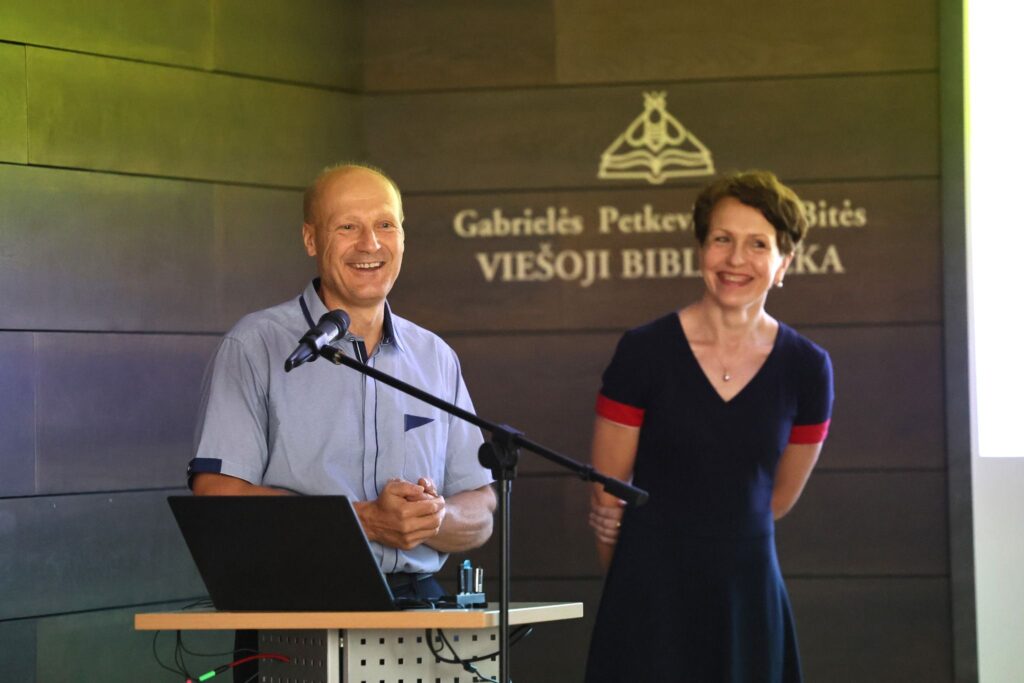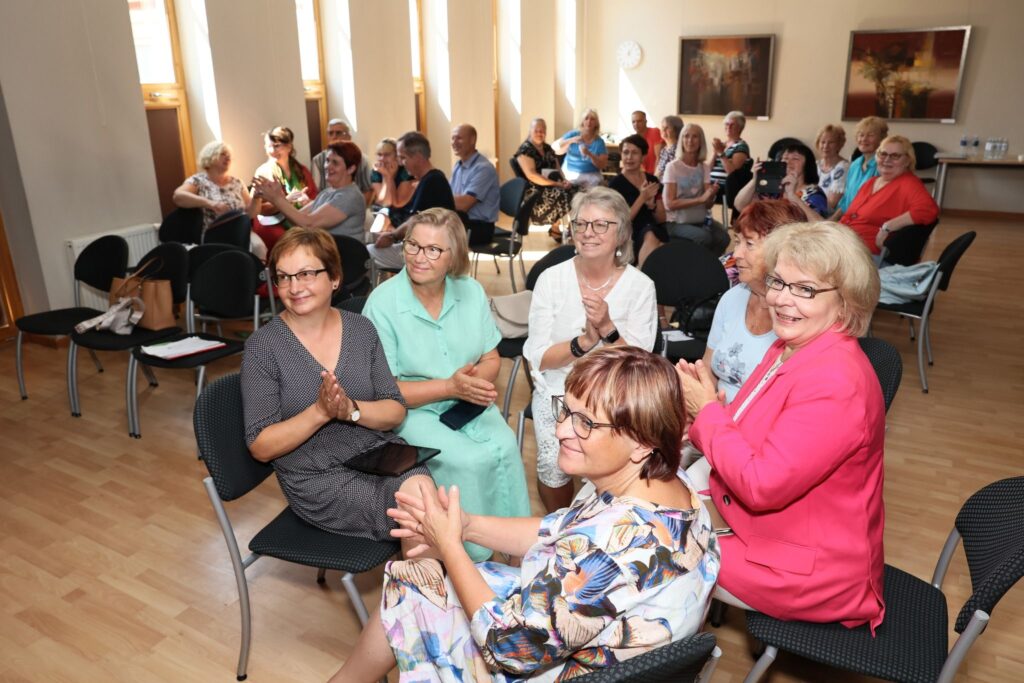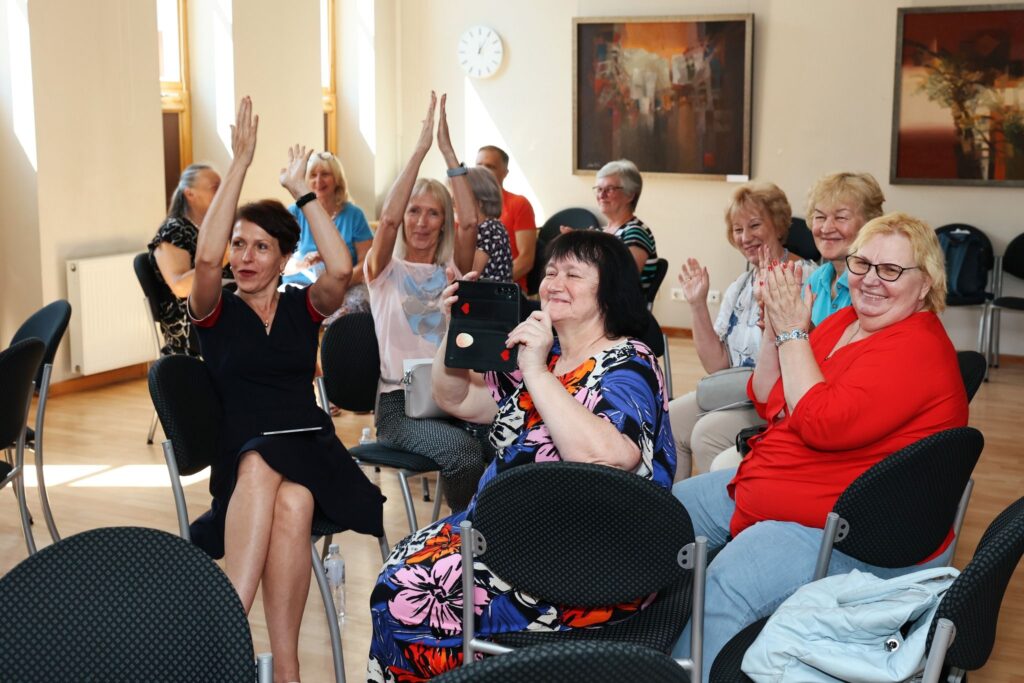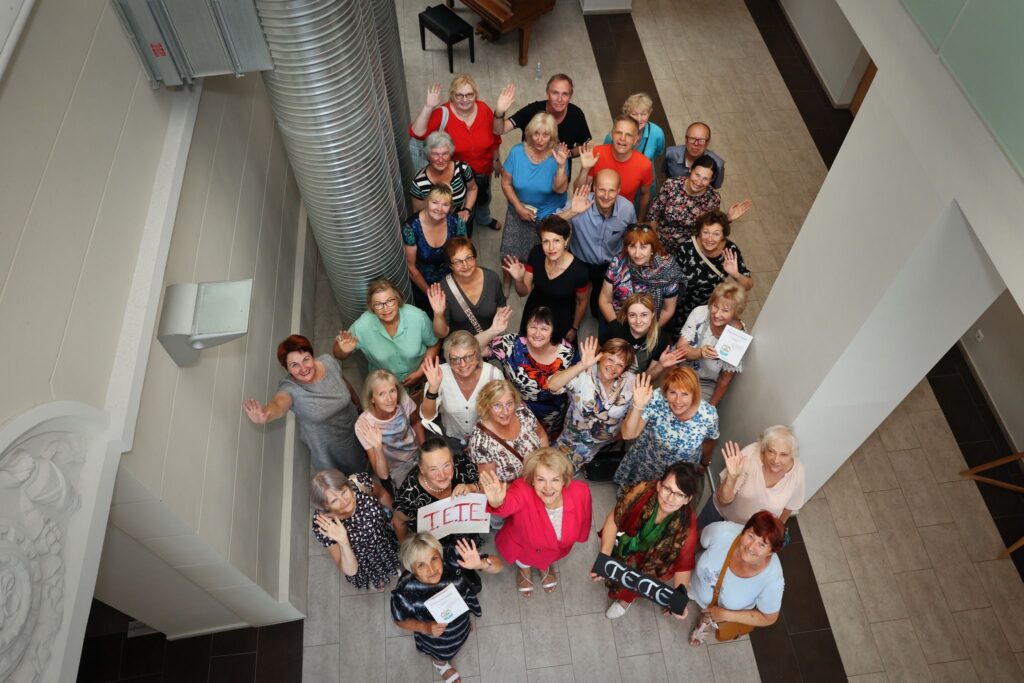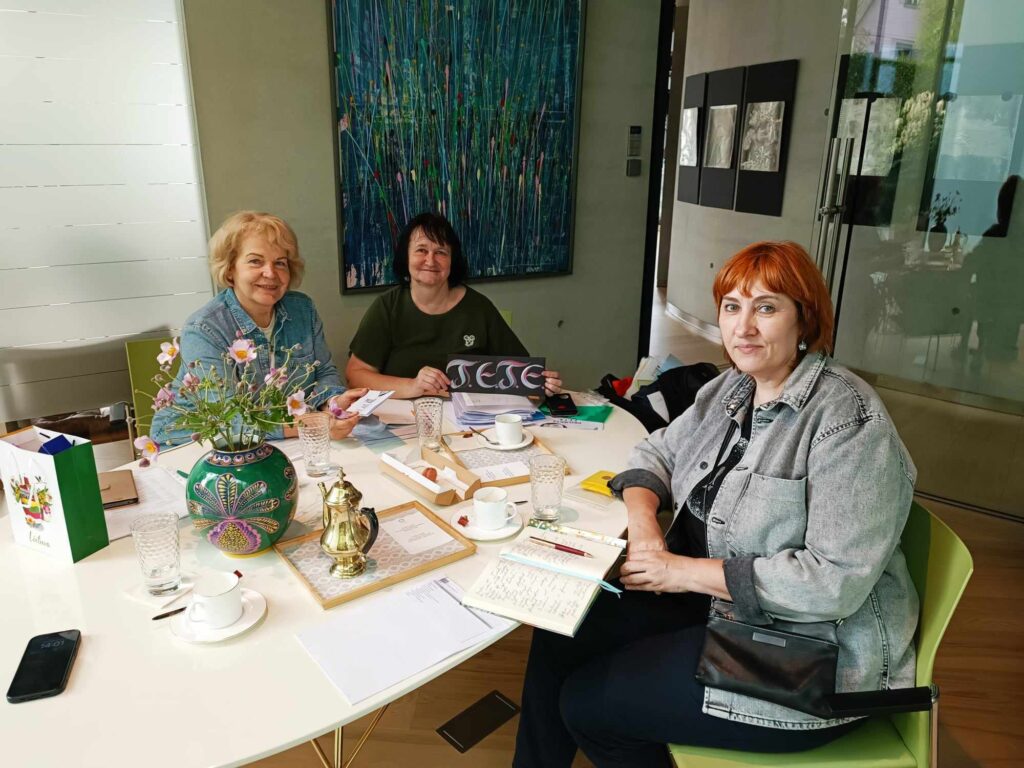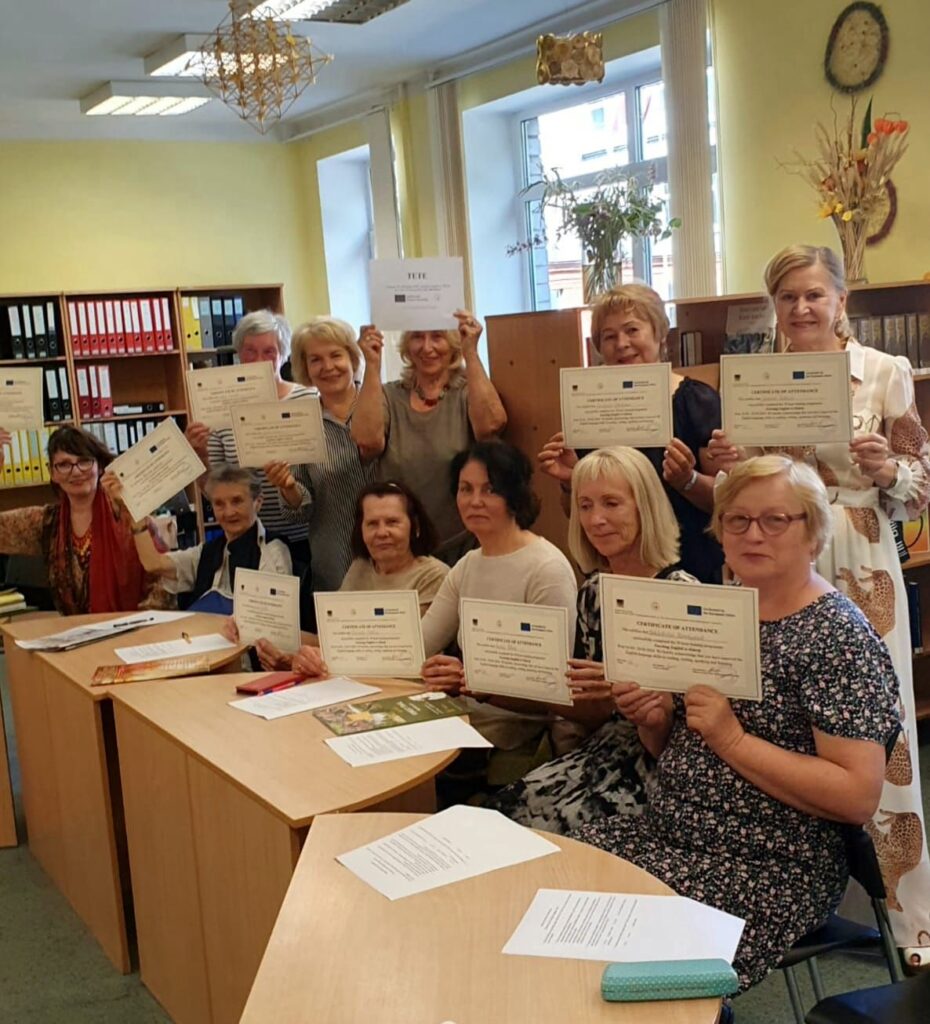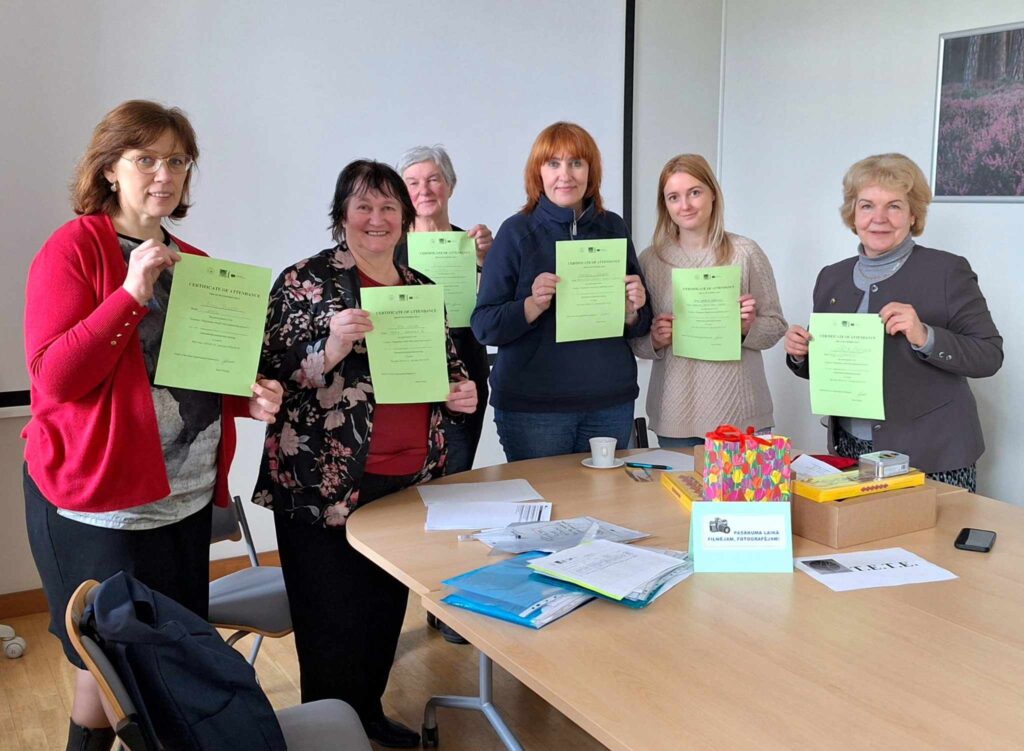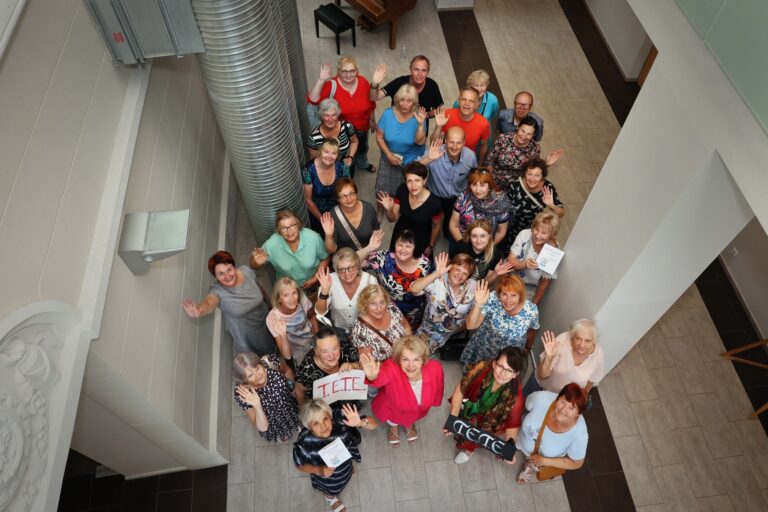The international initiative on teaching English to adults in Lithuania and Latvia was implemented thanks to the “Erasmus+” strategic partnerships program. The projects of this program allow international partners not only to learn from each other, but also to spread good practice to other adult educators and learners in Europe.
The activities of the project
The Erasmus+ program project “T.E.T.E” (“Teaching English to Elderly”) was coordinated by the Latvian NGO “Vecmāmiņas.lv” and was implemented from January to August, 2024. Panevėžys County Gabrielė Petkevičaitė-Bitė Public Library was the partner.
The main goal of this strategic partnership project was to adopt the good experience of European non-formal education institutions in the field of adult language learning, due to the partnership of the two countries, learning new effective methods of learning English, improving the linguistic and cultural competences of adult learners and promoting international cooperation.
In order to innovate in the field of non-formal language learning for adults, groups of adult learners in Latvia and Lithuania presented to each other the language learning methods they used and applied them in practice. The suggested methods were tested with groups of adult learners in Latvia and Lithuania (twenty persons aged 50+ and older learned in the target group of each country).
In addition to local English language classes for adults in Latvia and Lithuania, the project agenda also included two working group meetings in Lithuania (February and July) and Latvia (March and August). During these meetings, the partners not only participated in the planning sessions of the project activities, but also got acquainted with the possibilities of informal English language learning for adults in the visited country, visited libraries and other cultural institutions.
On the 9th-10th of July a conference took place in Panevėžys, during which learning progress and the effectiveness of tested English language learning methods were evaluated. During this event, groups of learners from both countries had the opportunity to communicate in person informally, and also participated in the practical part of the conference, where they tested their knowledge and improved their spoken English skills.
After the conference, the working groups of the project partners met in Latvia to discuss the content of the project publication and the future project report.
Throughout August, until the end of the project, groups of learners in Latvia and Lithuania continued to participate in local sessions, during which they tested new methods of learning English.
Impact and inspirations for the future
Adult learners from both countries evaluate the participation in this project positively and say that they gained useful linguistic and cultural experience. They tried new English learning methods and the particular methods helped them to get to know each other better. They shared their own experience and connected with other English learners internationally.
The used methods encouraged the adult learners to open to their conversation partners and to engage into thought-provoking discussions, helped to reduce the stress and fear of making mistakes, served as an ice-breaker when meeting a newcomer in the club. When using these methods in online sessions, a more diverse community was involved into discussion.
According to the chosen topics, the participants had deep discussions on social, psychological, philosophical issues and this encouraged them to learn some new words and expressions. The participants were brave enough to choose unusual and sometimes even controversial statements for their discussions.
“Erasmus+” program is a great opportunity to connect with adult English learners in other European countries. International projects are the best opportunities to share your own experience and to discover your methods to others. The participants of the project found out about new formats and methods of learning English, gained even more confidence in using the language. And they made once more sure that lifelong learning is an engaging and worthwile process.
Feedback from project coordinators and participants
Virginija Švedienė, coodinator of adult education activities, in charge of implementing the project “Teaching English to Elderly“ in Panevėžys County Gabrielė Petkevičaitė-Bitė Public Library: “The experience of our library in this project allowed us, adult educators, to learn new methods and formats of English language teaching and encouraged to prepare a program for library specialists working with groups of adult learners. This program will start in the fall of 2024. Collaboration with Latvian colleagues has inspired other international connections, seeking opportunities for adult learners to improve their spoken English skills by communicating with English native speakers. English conversations club “Let’s Talk” continues its cooperation with the book club in Missouri (USA) because the self-confidence gained thanks to the project “Teaching English to Elderly” allows our club members to strive for fluency. Thanks to the project, we established contacts with another English language club in Riga. These meetings enrich us both linguistically and culturally”.
Rita Liepina, English language trainer for the group of seniors in Latvia, one of the project coordinators: “Adult learners are excellent students to have in the classroom as they are always happy to talk about their experiences and give their opinions on different topics. Social element was very important in this project as seniors often attend class to mix with their peers, forming very strong friendships and socialising together after the class and even in their free time. Connecting with Lithuanian adult learners was also interesting for our learners in the sense that most of our learners (both Latvian and Lithuanian) are children of the Soviet times who attended school and learned foreign languages at the same time. Therefore, for them, learning English in this period of life was a certain challenge.
During the implementation process of this project, our organization received the “Erasmus+” program accreditation. We are sure that the experience of the project “Teaching English to Elderly” has fueled our growth as an institution, strengthened our partnership and teamwork skills, which will be very useful for us in the implementation of other international projects”.
Maira Magreca (76 y.o.) English learner from Latvia: “I think anyone can learn languages. People sometimes get stuck in – “I don’t know the language”, “I won’t go to that country”, “I am too old to learn” and so on. If you are going to a country, you need to have a minimum knowledge of the language so that you can have a minimum understanding, find your way or find your travel companions. Don’t put some kind of a flap on your ears. If you keep your eyes open, your ears open – anyone can learn a language.
There are opportunities to learn a language online, but better with a good teacher you respect and listen to and want to hear from”.

Virginija Švedienė
Coordinator of Adult Education Activities
